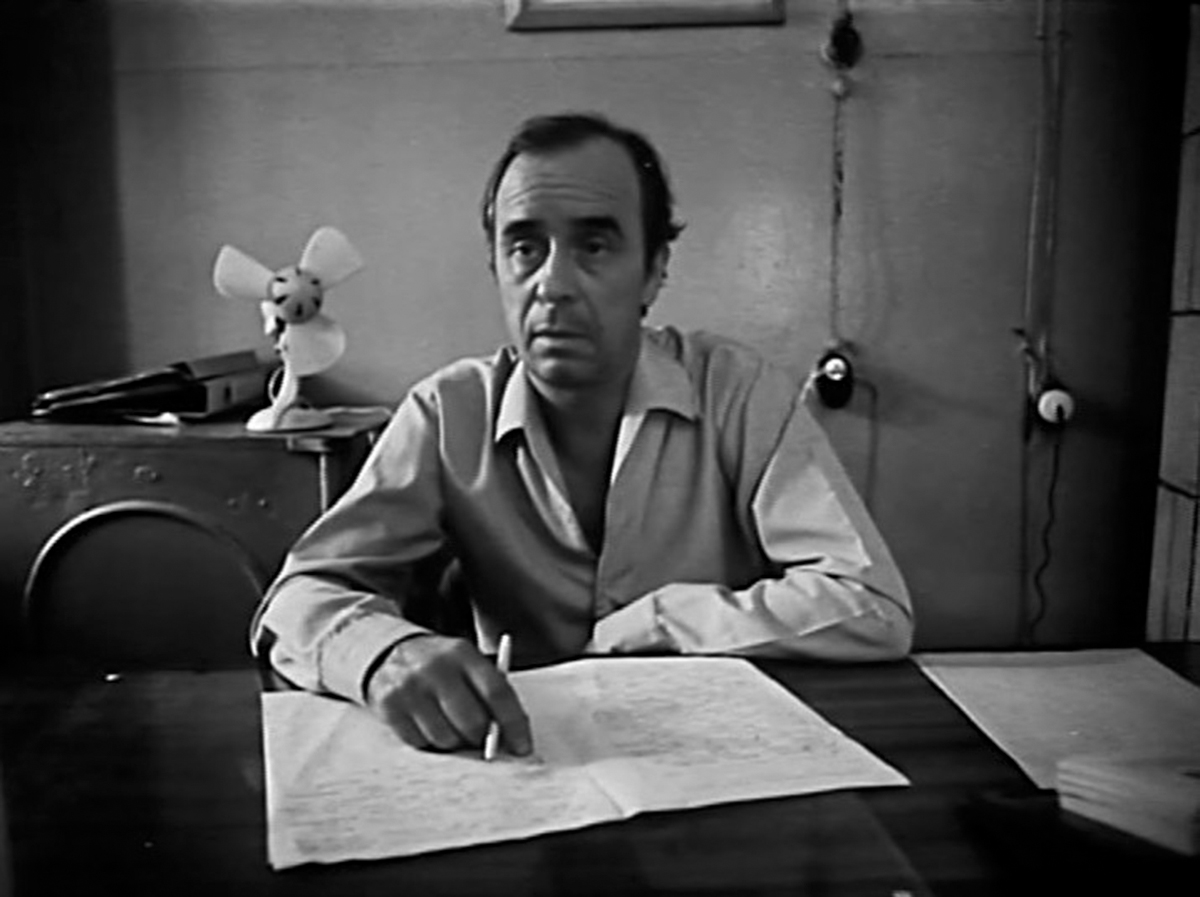He came to the cinema as an adult, having two higher educations – scientific, technical and cinematographic – and experience in production. Therefore, his works were aimed at both describing and studying individuals and human communities subjected to trials by the author and life. This was already evident in his term paper – the film adaptation of Grigory Gorin's story "Stop Potapov" (1973), in whose hero, a middle-Soviet civil servant, many saw similarities with Zilov from Alexander Vampilov's "Duck Hunt", that is, with the hero of stagnant time.
After such a notable debut, Abdrashitov was accepted to Mosfilm, where fate brought him together with the aspiring screenwriter Alexander Mindadze, the son of the famous screenwriter Anatoly Grebnev (in particular, the co-author of Khutsiev’s “July Rain”), who by that time had worked as a secretary in court and graduated from VGIK. Thus, one of the most fruitful tandems of Russian cinema was formed, which over the course of a quarter of a century (1978–2003) released 11 films and became the leader of contemporary Russian cinema. Objectively, it was addressed to the second of the four classes of Soviet society, not to say society, the scientific, technical and humanitarian intelligentsia.
This, as they used to say, stratum appreciated the very first picture of the tandem – “The Word for the Defense” (1976), a court drama in which a young lawyer is looking for arguments to justify the defendant, who almost killed her windy lover. In the dominant educational and ideological current of Soviet cinema, such a story could end with the fact that a traitor and a parasite would be sent to court, and the girlfriend who made an attempt on his life is presented as an arbiter of people's justice that went beyond the formal law. But the authors of The Word for Defense go in a different direction. They focus not on the simple-minded avenger (Marina Neelova), but on her more sophisticated protector (Galina Yatskina). She, at first intending to build an excuse for the client on the accusation of the victim, turns her eyes with pupils into her soul and discovers in her dissatisfaction with life and disharmony in relations with her husband, who prefers to evade problems or simply ignore them. In short, the same "moral anxiety" that was expressed in the aforementioned "July Rain" and Polish films of the 70s, generated by the armored Prague autumn of 1968.

The next film of the tandem with the telling title "Turn" (1978) is sustained in a reflective spirit. It is also based on a criminal incident, the unwitting culprit of which is a researcher performed by Oleg Yankovsky – three years later he was to play another hero of the stagnant years in Flights in a Dream and in Reality. A promising young scientist, returning by car from a summer vacation, knocks to death an old woman who suddenly came out onto an unlit highway. The innocence of the driver, who could not avoid the collision, is obvious, but Vedeneev courts the relatives of the deceased, urging them to tell the investigation that she was very short-sighted. In the course of this humiliating occupation, he is aware of the situation in which he finds himself, while the authors provide the viewer with the opportunity to feel the class tension between the middle and other Soviet estates. At the same time, the Soviet court, as in the “Word for the Defense”, is left aside and, thanks to the emphatically humane verdict, there is no doubt about its quality, although the hero’s excessive actions, behind which hide the national fear historically caused by the Stalinist trials, cast a shadow on the judicial system .

The third picture of the tandem, “Fox Hunting” (1980), is also built on a criminal case, but its hero is no longer a reflective intellectual, but a worker (Vladimir Gostyukhin), who is passionate about playing radio direction finding, who is beaten by two young guys for no apparent reason. One of them, through a lawyer hired by wealthy parents, is given a suspended sentence, and the second is sent to a colony for a couple of years. There, the victim begins to visit him, to whom it seems that he agreed to take on part of the comrade's guilt. According to the socialist realist canon, a conscious Soviet worker would have to re-educate the attacker, but the film follows a different course.
At first, it even seems that the hard worker has a task, hidden from himself, to play the role of a fake Rescuer (Eric Berne called this game “I'm only trying to help you”): under the pretext of helping another, avoid reflection on his own anxieties, increase self-esteem or take revenge. But the expectation of such a turn for some reason does not come true (there was a rumor that censorship did not allow compromising the honest educational efforts of the hegemon), and the plot ends with the release of the prisoner and the hero's exit from the original game of "fox hunting".
The fourth link in the chain of Abdrashitov's "judicial" tapes is "The Train Stopped" (1982), in pre-censored form – "Death of the Driver". The train, of course, stopped not to disembark passengers, not on schedule and not because of a traffic jam, but because it stumbled upon a platform that had moved off the siding, propped up with one heel instead of the two required. The driver's assistant managed to jump out just before the accident, and the elder died in the collision. To establish how this could happen, an investigator is sent (Oleg Borisov will have to shine more than once in the films of the tandem), who quickly finds out that the usual and habitual negligence is to blame, it is also a national “maybe”. But it turns out to be problematic to bring the case to court, since the interrogator himself stumbles upon an obstacle in the form of responsible railway authorities and ordinary townspeople who prefer the heroic myth of the engineer's feat to unpleasant reality.

That is, Abdrashitov and Mindadze were the first to illustrate on the screen the expression “plugging holes from slovenliness with heroism”, which was applied both to the military actions of the generals and to the planned economy with its eternal rush in the race to fulfill and overfulfill the boss’ plans that require super-effort and entail deadly catastrophes, liquidation which leads to new victims. The way in which the sovereign's vigilant eyes overlooked the outrageous sedition, hinting at the possibility of stopping the train flying to communism, or closed, letting it pass into the most important of all arts, is all the more surprising that after more than thirty years, Russian Minister of Culture Vladimir Medinsky called "the finished scum" of people who encroached on the heroic myth of 28 Panfilov's men.
The sovereign's eyes missed the outrageous sedition, hinting at the possibility of stopping the train flying to communism
Be that as it may, it was the stopped train that gave future interpreters the first reason to talk about the diagnostic and predictive nature of Abdrashit's cinema and at the same time compare it with a scanner (Andrey Plakhov) and a seismograph (Olga Surkova). Although getting a scan, interpreting the readings of the device and predicting the future are different things and not always compatible in one picture of the present.
Having completed the quadroptych, the co-authors rise to the next level of creativity: in 1984, with which hopes for changes in the life of the country were associated, Parade of the Planets appears on the screens, where the off-screen metaphysical dimension of Abdrashitov’s previous films manifests itself for the first time in intra-frame reality, and the hero of the film is appointed is no longer a single person experiencing an existential midlife crisis, but a group of people belonging to the same generation of “seventies,” to use the definition of the critic Alexei Erokhin.
A platoon of civilians of various professions and social status called up for the last military training (the Soviet army, as before, the court remains outside social analysis) falls under a conditional missile strike. Having left the game, he goes to an equally conditional next world – first to a kind of paradise, where only women live, and then to a kind of kingdom of the dead in the form of a nursing home, in which old men and old women stay (or live) entirely. One of them takes the unit commander (Oleg Borisov) for his son, which plunges him into deep thought, and the empathic viewers also into tears, which, like in the scenes of women's paradise, are amplified by Vladimir Shevtsik's camera and Vyacheslav Ganelin's music. And in these moments, the previously rational and restrained cinema of Abdrashitov turns into pure sensual magic, called kinogeny.
The next film of the A-M tandem, Plumbum or Dangerous Game (1986), brings into the frame a new Soviet hero in a frighteningly convincing performance by Anton Androsov (coincidentally, almost Andropov). The hero has a heroic name Ruslan, a speaking surname Chutko and an undercover nickname that combines the softness, heaviness of lead and its toxicity, and the title of the tape easily transforms into "Timur and his police team." Plumbum, who was once taken away from his cassette player, is a skilled manipulator who enjoys the acquired power, a forest nurse who considers it his duty to cleanse the city of homeless people, speculators and other violators of the regulated Soviet order. Among them is his father, who was caught by the newly-minted Pavlik Morozov fishing, which was forbidden to simple Soviet subjects, and forced by him to sign the detention protocol.
The picture, released at the height of perestroika and the year of the pivotal Fifth Congress of Cinematographers, made a lot of noise and caused, on the one hand, orthodox censure as a negative example that prompted Soviet youth to abandon their “active life position”, and on the other hand, fears that Plumbum, on the contrary, it will set a positive example, causing in the same youth the desire to organize and carry out a general purge of the ranks, like the one that the Nashi will try to carry out in the near future and to which the Boyakovs and Prilepins are now calling. In general, the co-authors hit a sore point and at the same time acted as visionaries.
Let's move on to "Armavir" (1991), in which numerous incidents of the previous films seem to have merged into a passenger liner accident, indicating a real collision of the cruise steamer "Admiral Nakhimov" (formerly the German "Berlin") with the dry cargo ship "Pyotr Vasev" in 1986, which resulted in the death of hundreds of people, and the collapse of the Soviet empire in the year the film was released on its screens. This watershed picture, which broke the arithmetic progression (1976–1978–1980–1982–1984–1986) of the years of the release of Abdrashit’s films, is also noteworthy by the previously unthinkable freedom of the director, which is different in terms of his willfulness in handling the material, which reached its maximum value and resonated both in ordinary and and in professional viewers, plucking out of some equally arbitrary, but in places exciting apophenic texts. But this time, the camera is not watching the investigation into the causes of the tragedy (which actually led to the indictment and subsequent sentencing of the captains of both ships to 15 years in prison for negligence in the line of duty) – it is watching the surviving passengers and families of the victims, who for two hours and ten minutes rushing around in the space of the frame in search of a certain Marina.
Looking ahead, let’s say that the two-part “Dancer’s Time”, which came out six years after “Armavir”, lasts two hours, is a rather lengthy story, but drawn out by an excellent acting ensemble and incendiary Cossack dances, the story of three fighting friends who, after winning an unnamed interethnic war, settled with spouses and mistresses in the houses of a seaside town from which the indigenous people were expelled or forced to flee. In passing, it is worth noting that one of the settlements was brilliantly played by the then debutante Chulpan Khamatova, who recently left Russia.
Between "Armavir" and "The Time of the Dancer" Abdrashitov shot "A Play for a Passenger" (1995), which finally closed the four judicial (from the word "fate") dramas written by Mindadze. Here, finally, an unrighteous judge appears, who in modern times involuntarily retrained as a wagon conductor (Sergey Makovetsky). He once put a blackmailer (Igor Livanov) behind bars for seven years, who, after being released from prison and changing the regime in the wild, became a legal businessman, eager to get even with the former representative of Soviet injustice. In Russia, this picture, released in the conditions of a fallen rental, did not arouse much interest, but was awarded the Berlin Festival Prize for being created under these conditions.
Six years after "Armavir", in 2003, the film "Magnetic Storms", which turned out to be the last in the commonwealth of A-M, appears. In it, the co-authors again refused to analyze the causes of what was happening, this time in a workers' settlement they had constructed, the inhabitants of which, prompted from behind the scenes by two warring oligarchs, almost continuously thrash each other with fists, sticks and rebar. The noise and fury are obvious and audible, but viewers who do not succumb to audiovisual pressure cannot help but be surprised that the fighters in the thick of the fight are trying to distinguish their own from the enemies with the question “Who are you for?”, That armed clashes do without the dead, and not exclaim: “Where are the police watching?!”, that is, the OMON, which is not subordinate to the local authorities. Magnetic storms, of course, affect people, but to attribute to them a purposeful influence on human communities is too much.
***
Concluding our cursory tour of the memorable places in the films of Abdrashitov and Mindadze, it is not a sin to use the metaphor of a stopped train: a film locomotive driven by two drivers stalled in front of insurmountable obstacles for the author's thought. The second driver got out and went his own way, the first tried to find a replacement and funds for a new car in order to switch to other tracks, but he could not, bitterly saying that the censorship of money is tougher than ideological. But he did not sit idle, but began to prepare a new generation of leading Lumiere trains to stations of an unknown future, and did this until death overtook the driver.


